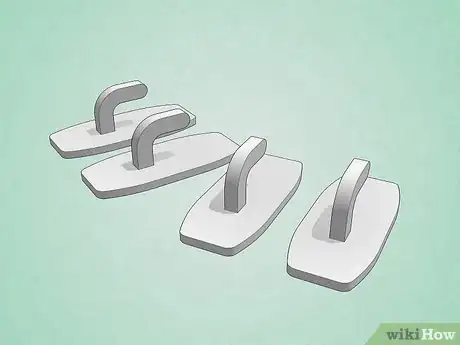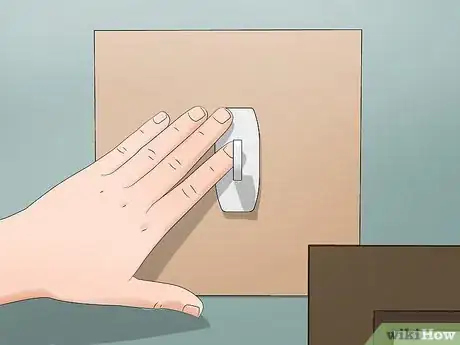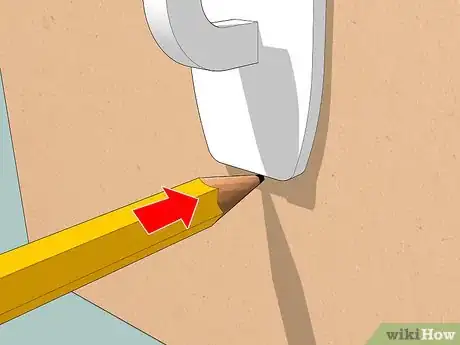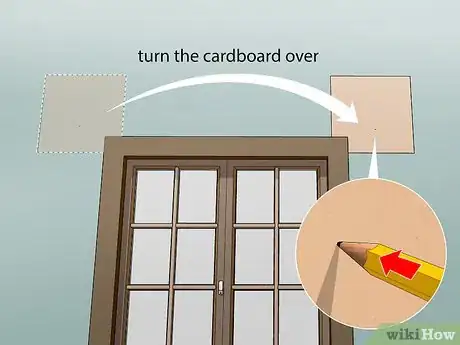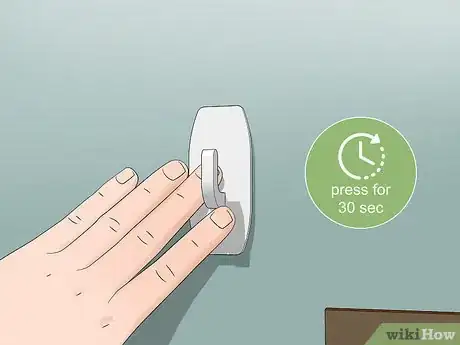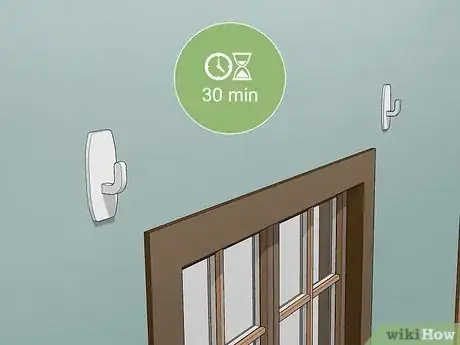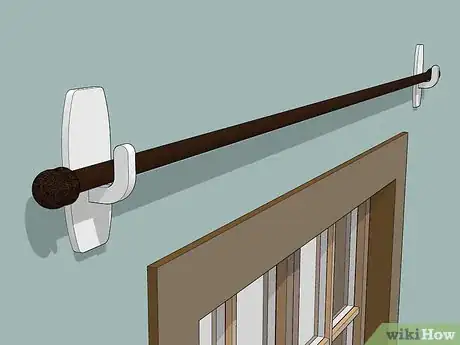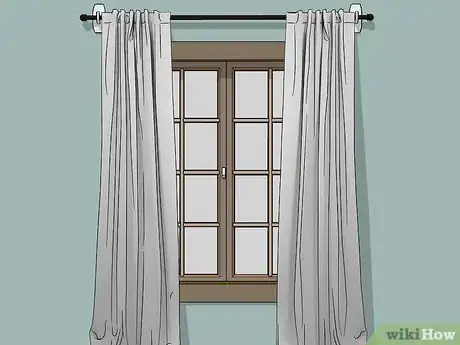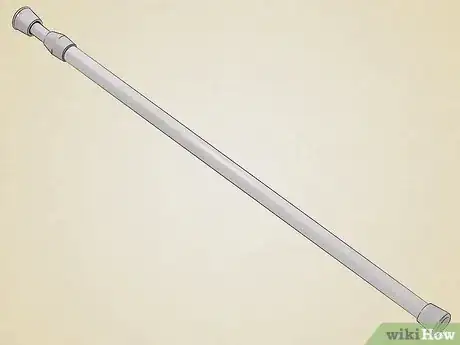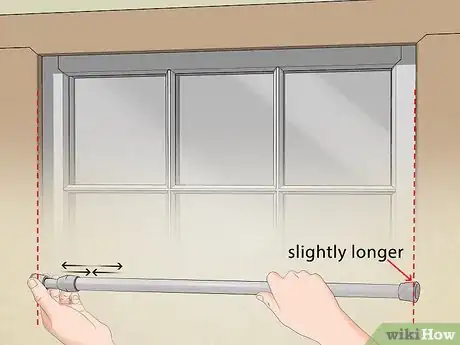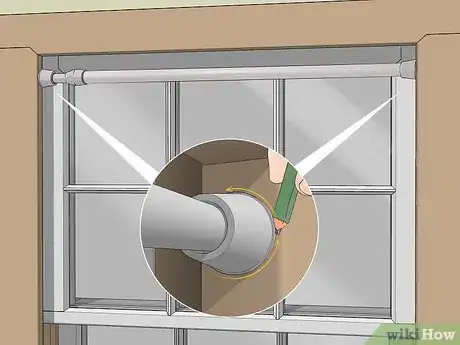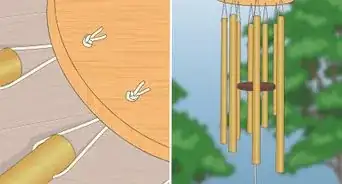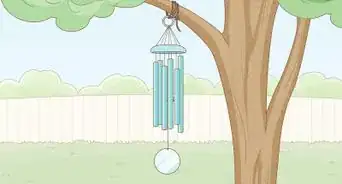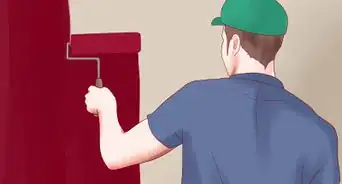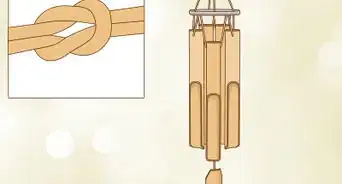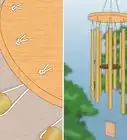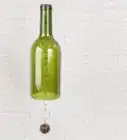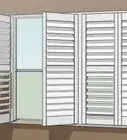This article was co-authored by Angelica Savard and by wikiHow staff writer, Kyle Hall. Angelica Savard is a Home Stager, Realtor, and Interior Designer based in Long Beach, California. She is also the Co-owner of Elegant Domain Interiors LLC, a business that offers design consulting, home staging, and window treatments. She has over 15 years of interior design and consulting experience. She earned a BA from California State University Long Beach with an emphasis on Interior Architectural Design.
This article has been viewed 99,574 times.
If you don't want to damage your walls or are renting a place where modifications aren't allowed, it might seem like hanging up curtains isn't an option. Fortunately, there are a few easy ways to hang curtains without having to drill holes in your walls. You can use adhesive hooks or a tension rod to hang up curtains without a drill.
Steps
Using Adhesive Hooks
-
1Purchase adhesive hooks that can hold the weight of your curtains. Adhesive hooks come in different weight capacities, and you'll want to make sure the hooks you get are strong enough to hold up your curtains and curtain rod so they don't fall. Generally, adhesive hooks that can hold up to 16 pounds (7.3 kg) should work.[1]
- You'll need 2 adhesive hooks per pair of curtains you want to hang up.
- You can find adhesive hooks online or at your local hardware store.
- Since you'll be using 2 adhesive hooks, each hook only needs to hold half of the weight of your curtains. For example, if your curtains and curtain rod weigh 32 pounds (15 kg) in total, you would need 2 adhesive hooks that can hold up to 16 pounds (7.3 kg) each.
- Many adhesive hook brands have stylized versions, made with steel or wood rather than plastic. Opt for these varieties if the aesthetic of your curtains is important to you.
-
2Cut a right angle out of a piece of cardboard. Draw a square at least 2 in (5.1 cm) wide in the corner of the piece of cardboard. Then, cut it out with scissors to create a right angle.[2]
- You'll use the piece of cardboard with the right angle in the corner to mark where you want to hang up your adhesive hooks so they're level with each other.
Advertisement -
3Align the cardboard with the window corner and mark the bottom of a hook on it. The corner of the window should be aligned with the right angle you cut out of the cardboard. Hold one of the adhesive hooks over the cardboard where you want to hang it, and mark the bottom of it on the cardboard with a pencil.[3]
-
4Push a pencil through the mark on the cardboard to mark the wall. Keep the cardboard aligned with the corner of the window while you puncture it with the pencil. You want the mark on the wall to be directly behind the mark on the cardboard.[4]
- Try twisting and pressing on the pencil simultaneously to puncture the cardboard.
-
5Turn the cardboard over and mark the same spot on the other window corner. Align the right angle on the cardboard with the other side of the window, and use the pencil to make a mark through the hole you punctured in it.
- Now you should have a mark on each side of the window to show you where to hang your adhesive hooks. The marks should be level.
-
6Align the hooks with the marks and press them in for 30 seconds. Take the adhesive strip off of the back of your hooks and press them firmly on the wall so the marks you made are lined up with the bottoms of the hooks.[5]
- Make sure you press on the hooks for 30 seconds so the adhesive sticks.
-
7Let the adhesive on the hooks dry for at least 30 minutes. The adhesive on the hooks needs time to dry before it's secure. If you try to hang your curtains on the hooks too soon, they might fall down.[6]
- The exact amount of time you should wait may vary depending on the kind of adhesive hooks you're using. Refer to the packaging for specific instructions.
-
8Place your curtain rod on the hooks and test how well it holds. Your curtain rod should balance perfectly on the hooks. If it slides or tilts in one direction, the hooks might not be level. Try removing one of the hooks and checking to see that the marks are level.[7]
-
9String your curtain on the curtain rod and hang it up. Run the curtain rod through the hoops at the top of your curtains and then hang it up again. Draw the curtains and let them sit for 1 hour to make sure the adhesive hooks can hold the weight.[8]
- If your curtain falls, either the adhesive didn't fully stick to the wall or your curtain may be too heavy for the hooks. Consider buying higher-weight capacity hooks, or use 2 adjacent hooks on each side to balance the weight a little better.
Setting Up a Tension Rod
-
1Measure from one side of the window to the other. Start at the inner edge of the window frame and measure to the opposite inner edge to get the window's width. You'll use the width to purchase to the right size tension rod for your curtains.[9]
-
2Buy a tension rod that will fit inside your window. Tension rods have a spring mechanism inside of them that creates tension when the ends of the rod are pressed against a window frame. If the rod is too short, there won't be enough tension, and if the rod is too long, there will be too much tension. Tension rods generally list a window size range on the packaging, so look for one that will work based on the width of your window.[10]
- You can find tension rods online or at your local hardware store.
- If you have particularly heavy curtains, you may want to try adhesive strips instead of a tension rod. A tension rod is best for small, lightweight curtains.
-
3Adjust the tension rod so it's slightly longer than the width of your window. The right way to adjust the length of your tension rod will depend on the model you're using, but generally, you'll pull or twist on the rod. You want the tension rod to be slightly longer than the width of your window so there's enough tension to hold it in place.[11]
- If you're not sure how to adjust the length of your tension rod, refer to the instructions that came with it.
-
4Insert the rod into the window frame and mark where each end is. Use a pencil to draw a circle around each end of the tension rod where it pushes into the frame. Use a level to make sure the rod is even before you make your marks.[12]
-
5Take down the rod and hang your curtains on it. Slide the hoops or fasteners on your curtains onto the rod. Make sure all of the panels you want to use are on and facing the right direction since you'll need to take the tension rod down if you want to adjust them.[13]
- If your curtains have clips instead of hoops, you don't need to take the tension rod down to hang them up.
-
6Hang up the tension rod and curtains. Insert the tension rod into the frame so the ends are aligned with the marks you made earlier. If the rod doesn't feel secure, you may need to take it down and adjust it so it's longer and there's more tension.
Expert Q&A
Did you know you can get expert answers for this article?
Unlock expert answers by supporting wikiHow
-
QuestionCan I use command strips to hang things on my wall?
 Angelica SavardAngelica Savard is a Home Stager, Realtor, and Interior Designer based in Long Beach, California. She is also the Co-owner of Elegant Domain Interiors LLC, a business that offers design consulting, home staging, and window treatments. She has over 15 years of interior design and consulting experience. She earned a BA from California State University Long Beach with an emphasis on Interior Architectural Design.
Angelica SavardAngelica Savard is a Home Stager, Realtor, and Interior Designer based in Long Beach, California. She is also the Co-owner of Elegant Domain Interiors LLC, a business that offers design consulting, home staging, and window treatments. She has over 15 years of interior design and consulting experience. She earned a BA from California State University Long Beach with an emphasis on Interior Architectural Design.
Home Stager, Realtor, & Interior Designer
-
QuestionCan you hang curtains without anchors?
 Drew Hawkins1Community AnswerThe easiest way is to use adhesive hooks. Adhesive hooks come in different weight capacities, and you'll want to make sure the hooks you get are strong enough to hold up your curtains and curtain rod so they don't fall. Generally, adhesive hooks that can hold up to 16 pounds (7.3 kg) should work. Use a ruler or tape measure to measure a straight line and mark where you want to place your hooks on the wall. Take the adhesive strip off of the back of your hooks and press them firmly on the wall so the marks you made are lined up with the bottoms of the hooks. Let the adhesive on the hooks dry for at least 30 minutes. Then, you can hang your curtain rod on the hooks and attach your curtains to them.
Drew Hawkins1Community AnswerThe easiest way is to use adhesive hooks. Adhesive hooks come in different weight capacities, and you'll want to make sure the hooks you get are strong enough to hold up your curtains and curtain rod so they don't fall. Generally, adhesive hooks that can hold up to 16 pounds (7.3 kg) should work. Use a ruler or tape measure to measure a straight line and mark where you want to place your hooks on the wall. Take the adhesive strip off of the back of your hooks and press them firmly on the wall so the marks you made are lined up with the bottoms of the hooks. Let the adhesive on the hooks dry for at least 30 minutes. Then, you can hang your curtain rod on the hooks and attach your curtains to them. -
QuestionHow can I hang curtains with nails?
 Drew Hawkins1Community AnswerA tension rod is a great way to put up curtains without having to drill or nail anything! Tension rods have a spring mechanism inside of them that creates tension when the ends of the rod are pressed against a window frame. If the rod is too short, there won't be enough tension, and if the rod is too long, there will be too much tension. Tension rods generally list a window size range on the packaging, so look for one that will work based on the width of your window. Measure one side of your window to the other starting at the inner edge of the window frame. That'll give you accurate measurements to make sure you get the right-sized rod. Adjust the tension rod so it's slightly longer than the width of your window, then insert the rod into the window frame and mark where each end is. You can then take the rod out, slide your curtains over the rod, and then install it in the window frame.
Drew Hawkins1Community AnswerA tension rod is a great way to put up curtains without having to drill or nail anything! Tension rods have a spring mechanism inside of them that creates tension when the ends of the rod are pressed against a window frame. If the rod is too short, there won't be enough tension, and if the rod is too long, there will be too much tension. Tension rods generally list a window size range on the packaging, so look for one that will work based on the width of your window. Measure one side of your window to the other starting at the inner edge of the window frame. That'll give you accurate measurements to make sure you get the right-sized rod. Adjust the tension rod so it's slightly longer than the width of your window, then insert the rod into the window frame and mark where each end is. You can then take the rod out, slide your curtains over the rod, and then install it in the window frame.
wikiHow Video: How to Hang Curtains Without Drilling
Warnings
- Be careful hanging your curtain rod in case it falls.⧼thumbs_response⧽
References
- ↑ https://www.apartmenttherapy.com/how-to-hang-curtains-no-drilling-required-240695
- ↑ https://interior-design.wonderhowto.com/how-to/hang-curtains-without-making-holes-wall-362981/
- ↑ https://interior-design.wonderhowto.com/how-to/hang-curtains-without-making-holes-wall-362981/
- ↑ https://interior-design.wonderhowto.com/how-to/hang-curtains-without-making-holes-wall-362981/
- ↑ https://www.forrent.com/blog/apt_life/diy-damage-free-curtain-hanging/
- ↑ https://interior-design.wonderhowto.com/how-to/hang-curtains-without-making-holes-wall-362981/
- ↑ https://www.forrent.com/blog/apt_life/diy-damage-free-curtain-hanging/
- ↑ https://www.forrent.com/blog/apt_life/diy-damage-free-curtain-hanging/
- ↑ http://alittledesignhelp.com/what-is-a-tension-rod/
- ↑ http://alittledesignhelp.com/what-is-a-tension-rod/
- ↑ http://alittledesignhelp.com/what-is-a-tension-rod/
- ↑ https://www.apartmenttherapy.com/how-to-hang-curtains-no-drilling-required-240695
- ↑ https://www.apartmenttherapy.com/how-to-hang-curtains-no-drilling-required-240695
- ↑ Angelica Savard. Home Stager, Realtor, & Interior Designer. Expert Interview. 30 April 2020.
- ↑ Angelica Savard. Home Stager, Realtor, & Interior Designer. Expert Interview. 30 April 2020.
About This Article
If you want to hang curtains without drilling any holes, you have a couple of options. One is to use adhesive hooks. Start by weighing your curtains and curtain rod so you know how much weight the hooks need to be able to hold. Since you’ll be using two hooks, each hook only needs to be able to hold half of that weight. For instance, two 16-pound (7.3 kg) hooks together can hold up to 32 pounds (15 kg) total. Put a pair of pencil marks on the wall on either side of the window where you want the hooks to be, making sure that they’re level. Then, peel off the adhesive backings on the hooks and press them firmly to the wall for about 30 seconds each. Wait another 30 minutes before hanging the rod so that the adhesive has time to fully set. Double-check that the hooks are level, then hang the rod and curtains on the hooks. Another option is to use a tension rod. Measure the width of your window frame from one inside edge to the other, then buy a tension rod that will fit. These rods expand to fit the space, so check the package for a size range that matches your window. Extend the rod so it’s slightly wider than the window frame, then insert it into the frame at the desired height. The extra width will help create tension and keep the rod in place. Check that it’s level, then use a pencil to mark where the ends of the rod go. Remove the rod from the window and hang the curtain on it, then reinstall it in the position where you put the marks. For more tips, including how to line up your adhesive hooks with your window, read on!
